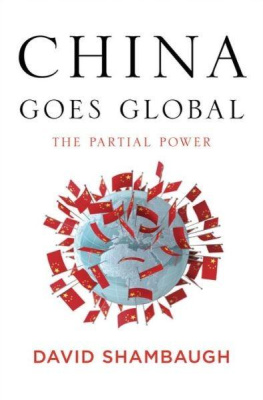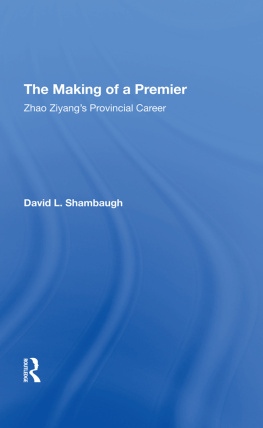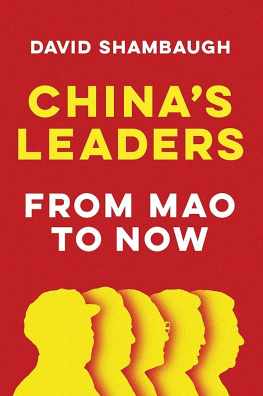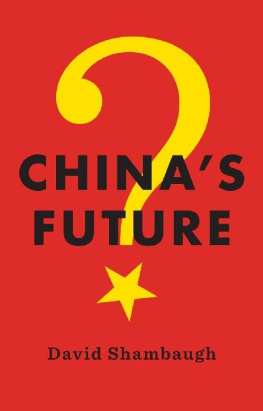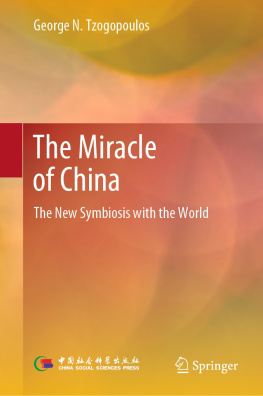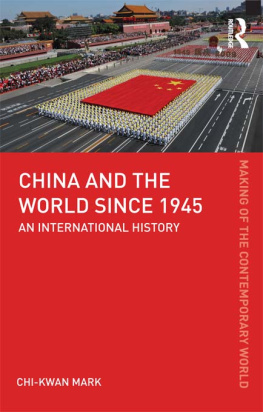Copyright 1991 by Princeton University Press
Published by Princeton University Press, 41 William Street,
Princeton, New Jersey 08540
In the United Kingdom: Princeton University Press,
Chichester, West Sussex
All Rights Reserved
Library of Congress Cataloging-in-Publication Data
Shambaugh, David L.
Beautiful imperialist: China perceives America, 1972-1990 / David
Shambaugh.
p. cm.
Includes indexes.
ISBN 0-691-07864-5
ISBN 0-691-02486-3 (pbk.)
eISBN 978-0-69122-776-4 (ebook)
1. United StatesForeign public opinion, Chinese. 2. Public opinionChinaHistory20th century. I. Title.
E183.8.C5S46 1991
973.92dc20 91-2135 CIP
R0
Preface
I HAVE SPENT a decade immersed in studying Chinese perceptions of the United States. It has been an extraordinarily interesting pursuit. It has brought me an enriched understanding of my native land (especially through others' eyes) as well as an enriched understanding of the country of my professional interest. I hope this volume will interest readers as much as it has the author. Americans will no doubt find many of the Chinese Marxist interpretations of their nation both startling and illuminating. Chinese readers will no doubt find of interest what their countrymenwhom I designate "America Watchers"have to say about the United States. Those America Watchers who have contributed the commentary I portray in this volume will, I hope, not be offended. I have done my resolute best to translate their writings and spoken words accurately, to convey properly the context of their statements, and I apologize for any inaccuracies or misstatements of fact. At the same time, some of China's America Watchers and the Chinese political elite may not find this a book "friendly to China." It was not intended to be. Scholarship is supposed to be objective. I have endeavored to be objective in my portrayals of Chinese perceptions of America and my analyses of them. If friendship is characterized by candor, then this is a "friendly" study.
Readers in both China and the United States can take heart in the principal finding that, since the Sino-American rapprochement of 1972, Chinese understanding of the United States has improved markedly, despite continued distortion and misperception. It is my belief that only through continued improvement of mutual understanding will Sino-American relations be able to attain the constructive equilibrium that has eluded both nations for so long.
London
July 1990
Acknowledgments _______________________
THIS VOLUME had its origins in a doctoral dissertation. The topic was inspired by my own interests in the role of perceptions in international relations and in Sino-American relations and received impetus from my two Ph.D. supervisors at the University of Michigan, professors Michel Oksenberg and Allen Whiting (later of the University of Arizona). I thank Professor Oksenberg for his continual push for precision and nuance, for asking the tough (and often unanswerable) questions, for his personal interest in the subject, and for his friendship. Professor Whiting has been a pacesetter in the study of perception and Chinese foreign policy, from his classic China Crosses the Yalu to his more recent China Eyes Japan. His attention to detail, subliminal arguments, and the linkage between perception and policy enriched this study immeasurably, and I am in his debt for this assistance. His personal warmth and friendship also proved crucial at several difficult stages.
The other members of my original dissertation committee at Michiganprofessors Harold Jacobson, Kenneth Lieberthal, Alfred Meyer, and Martin Whyteare also due my deep gratitude for their input to this study and contributions in and out of the classroom. Various parts of the manuscript reflect their expertise and advice.
Numerous colleagues in the China field have taken the time to read and comment on the manuscript. I owe particular thanks to Gilbert Rozman, Steven Levine, and Steven Goldstein for their painstaking care and constructive criticisms as outside reviewers. Their suggestions made turning a dissertation into a book a considerably easier task. I also thank Harry Harding, Michael Hunt, Jonathan Pollack, and Michael Yahuda, who have taken the time to read drafts and discuss the topic with me. To all I owe a great debt.
I also thank my numerous Chinese colleagues and friends who over the years have shared with me their views on the United States. Many have taken much time and, in some cases, personal risk. During various phases of the research I have been hosted in China by the International Politics Department at Peking University, the American Studies Centers at Fudan and Wuhan universities, and the Institute of American Studies and Institute of World Economics and Politics at the Chinese Academy of Social Sciences. Thanks to all concerned for making arrangements and providing hospitality.
My colleagues in the Department of Political Studies at the School of Oriental and African Studies, University of London, have endured seminar discussions on aspects of the topic and provided many useful comments for improvement of the manuscript.
No book, at least one of this nature, can reach fruition without financial support. Along the way the following bodies have contributed funds for my research on this project: the Horace H. Rackham School of Graduate Studies at the University of Michigan; the Office of Research of the United States Information Agency; the Ford Foundation; the Committee on Scholarly Communication with the People's Republic of China; and the China Exchange Scheme of the British Academy/Economic and Social Research Council of the United Kingdom. The Woodrow Wilson International Center for Scholars and the School of Oriental and African Studies both provided necessary leave time for research and writing.
At Princeton University Press, Asian Studies editor Margaret Case has been very supportive and professional in her assistance. Anita O'Brien has proven a superb copy editor and has made this a far better manuscript than was originally the case. Working with both has been a pleasure.
Last, but by no means least, I owe a deep debt to family and friends. My fellow graduate students at Michiganparticularly Scott Wong, Carrie Warra, Diane Scherer, Tom Buoye, Steve Jackson, Shen Mingming, and Iain Johnstonlent moral and intellectual support at crucial junctures. My parents, George and Genevieve Shambaugh, and my brother George E. Shambaugh III, anxiously watched the whole process and have been vital sources of support in many ways. My wife Ingrid and son Christopher have both been deprived of countless hours of a husband and father as a result of this project. This book is therefore lovingly dedicated to them.


